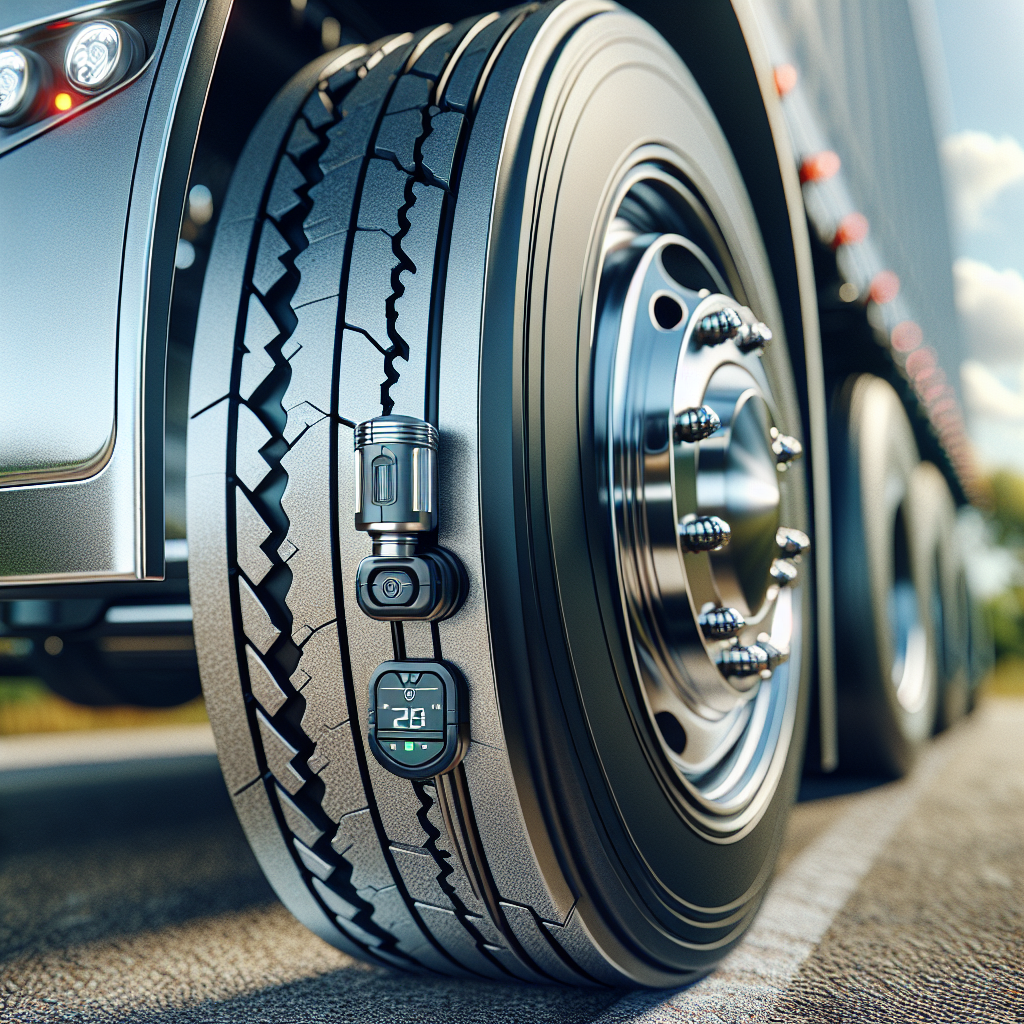In the realm of trailer safety and maintenance, the TPMS sensor for trailer tires plays a crucial role that cannot be overlooked. These sensors are designed to monitor tire pressure in real-time, providing vital data that helps prevent tire-related failures, which can lead to catastrophic incidents on the road.
By maintaining optimal tire pressure, TPMS sensors help ensure improved fuel efficiency, enhanced handling, and prolonged tire life. Consider the following benefits:
- Enhanced Safety: Proper tire pressure is essential for safe towing. Under-inflated tires can overheat and fail, posing a danger to both the trailer and surrounding vehicles.
- Cost Savings: By preventing premature tire wear and reducing fuel consumption, TPMS sensors can lead to significant savings over time.
- Real-Time Monitoring: These sensors provide immediate alerts if tire pressure falls below safe levels, allowing for timely adjustments before a problem escalates.
Incorporating a TPMS sensor into your trailer's monitoring system not only promotes safety but also adds a smart dimension to your towing experience. With the advancements in trailer technology, there's no reason to compromise on safety.
Tow with peace of mind, knowing that trailerwatchdog is standing guard.
How TPMS Sensors Enhance Trailer Safety and Performance

TPMS sensors are revolutionizing the way we think about trailer safety and performance. By continuously monitoring tire pressure and temperature, these sensors provide essential data that can significantly enhance the overall safety of trailer operations.
One of the primary advantages of TPMS sensors is their ability to detect pressure fluctuations in real-time. This feature allows trailer operators to address potential issues before they escalate into serious problems. For instance, if a tire is losing air or is over-inflated, the TPMS sensor will trigger an alert, enabling the driver to make necessary adjustments immediately. This proactive approach not only prevents blowouts but also contributes to safer towing experiences.
Furthermore, maintaining the correct tire pressure is vital for optimal performance. Properly inflated tires improve traction and handling, particularly during sharp turns or in adverse weather conditions. Additionally, a well-maintained tire helps in achieving better fuel efficiency, which is crucial for long-haul journeys. The reduction in rolling resistance due to correctly inflated tires can lead to lower fuel consumption and reduced emissions, making it an environmentally friendly choice.
In conclusion, the integration of TPMS sensors into trailer systems not only enhances safety but also optimizes performance, ensuring that every journey is as efficient and secure as possible.
Key Features of an Effective TPMS Sensor for Trailer Tires

When selecting a TPMS sensor for trailer tires, it's essential to consider several key features that enhance its effectiveness and reliability. A quality TPMS sensor ensures that your trailer remains safe and efficient on the road.
Here are some critical features to look for:
- Real-time Monitoring: An effective TPMS sensor provides continuous monitoring of tire pressure and temperature, delivering instant alerts to the driver if any irregularities occur. This feature is crucial for preventing tire blowouts and ensuring optimal performance.
- Durability: Given the harsh conditions trailers often face, a robust TPMS sensor must be built to withstand extreme temperatures, vibrations, and exposure to road debris. Look for sensors with weather-resistant designs.
- Easy Installation: The best TPMS systems are user-friendly and can be installed quickly without the need for specialized tools. A seamless installation process saves time and ensures that you can start monitoring your trailer tires promptly.
- Battery Life: Long-lasting battery life is a significant consideration, as frequent battery replacements can be inconvenient and costly. Opt for sensors that offer extended battery life to ensure continuous monitoring.
- Data Transmission: A reliable TPMS sensor should have a solid communication range, allowing for real-time data transmission to a display unit or smartphone app. This feature enables convenient monitoring while on the move.
By focusing on these key features, trailer owners can select a TPMS sensor that not only enhances safety but also boosts the overall performance of their trailers.
Installation and Maintenance Tips for TPMS Sensors

Proper installation and maintenance of your TPMS sensor for trailer tires are vital to ensure its longevity and accurate performance. Following best practices will help you maximize the benefits of the system while minimizing potential issues.
Here are some essential tips for installation and maintenance:
- Follow Manufacturer Instructions: Each TPMS sensor comes with specific installation guidelines. Always refer to the manufacturer’s manual to ensure compatibility and correct setup.
- Check Tire Pressure: Before installing the sensors, make sure that all tires are inflated to the recommended pressure levels. This step ensures that the sensors calibrate correctly and provide accurate data.
- Position Sensors Properly: When mounting the sensors on the valve stems, ensure they are securely fastened and oriented correctly for optimal performance. Improper positioning can lead to inaccurate readings.
- Regularly Inspect Sensors: Periodically check the sensors for signs of wear, damage, or corrosion. Ensuring that they are in good condition will help maintain effective monitoring.
- Update Firmware: If your TPMS sensor comes with software or firmware updates, make sure to install them when available. Updates can improve functionality and enhance safety features.
- Battery Checks: For battery-operated sensors, perform routine checks to ensure they are functioning correctly. Replace batteries as needed to maintain continuous monitoring.
By adhering to these installation and maintenance tips, you can ensure that your TPMS sensor operates efficiently and effectively, providing you with the peace of mind necessary for safe travels.
Comparing Different Types of TPMS Sensors for Trailers

When considering a TPMS sensor for trailer tires, it’s essential to understand the various types available on the market. Different sensors serve different needs, and each type comes with its own set of advantages and disadvantages. Here’s a breakdown of the most common types:
- Direct TPMS: This type uses sensors mounted directly on each tire's valve stem to monitor tire pressure and temperature. Direct TPMS provides real-time data and alerts you instantly when tire pressure drops below safe levels. However, they can be more expensive and require more frequent calibration.
- Indirect TPMS: Indirect systems do not use physical sensors on the tires. Instead, they rely on the vehicle’s ABS (Anti-lock Braking System) to monitor wheel speed. If a tire is under-inflated, it will rotate faster than properly inflated tires, triggering a warning. While indirect systems are generally less expensive, they may not provide real-time pressure readings.
- Internal Sensors: These sensors are located inside the tire, making them less susceptible to damage and tampering. They offer accurate pressure readings and temperature monitoring but require professional installation and may incur additional costs for maintenance.
- External Sensors: External sensors are mounted on the valve stem and are easy to install and replace. They provide real-time data and alerts but are more vulnerable to environmental conditions, which can affect their longevity.
When selecting the right TPMS sensor for your trailer, consider factors such as your budget, installation preferences, and the level of monitoring you require. Understanding the differences between these types will help you make an informed decision, ensuring your trailer remains safe on the road.
Future Trends in Trailer Tire Monitoring Technology
The landscape of trailer tire monitoring technology is evolving rapidly, driven by advancements in digital technology and increasing safety demands. As we look to the future, several trends are emerging that promise to enhance the capabilities of TPMS sensors for trailer tires:
- Integration with IoT: The Internet of Things (IoT) is set to revolutionize how we monitor trailer tires. By connecting TPMS sensors to the cloud, users can access real-time data from anywhere, allowing for proactive maintenance and immediate alerts for any tire issues.
- Artificial Intelligence: AI algorithms will enhance data analysis, enabling predictive analytics that can foresee potential tire failures before they occur. This proactive approach will not only improve safety but also reduce downtime and maintenance costs.
- Enhanced User Interfaces: Future TPMS systems are expected to feature more intuitive user interfaces, offering drivers easy access to tire health data through mobile apps or integrated dashboard displays. This will provide a seamless experience and improve driver awareness.
- Wireless Charging: As the demand for battery-operated sensors grows, advancements in wireless charging technology may eliminate the need for frequent battery replacements, thus ensuring continuous operation of the monitoring system.
As these technologies continue to develop, they will significantly improve the safety, efficiency, and reliability of trailer tire monitoring systems. Tow with peace of mind, knowing that trailerwatchdog is standing guard.








